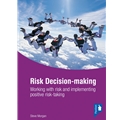As I start this new chapter in the 'Practice Based Evidence' website, I thought it worth revisiting a basic principle...
What is 'Practice Based Evidence'?
Established in October 2001 by Steve Morgan, 'Practice Based Evidence' presents a challenge for us all to think more carefully about the ways we can support the development of good practice in mental health services. If 'mental health research' is as informative as its authors believe, why is it inaccessible to the average practitioner and service user? If 'mental health training' is as effective as its facilitators believe, why is it having so little impact on practice?
The confines of the orthodox...
Good quality 'mental health research' should present challenges to routine ways of doing things. It should illuminate new as well as existing ways of working; and it should be able to excite people into thinking of ways they can change what it is they are doing.
 Steve was ready for anything the critics were going to throw at him.
Steve was ready for anything the critics were going to throw at him.
The amount of attention drawn to the concept of 'Evidence Based Practice' has conveniently supported the development of a citadel populated exclusively by academics, policy-makers and managers. A shared language helps to define a sense of self-importance, by presenting significant barriers to accessibility by others. Protocols, targets and audits present impenetrable walls, and the gold standard 'randomised control trial' is the heavy-duty portcullis barring the entrance to any external influences. Nowhere in this picture of fortification do we get a sense of the realities and details of everyday practical experience. Those who research and develop policy are largely exonerated from venturing out into the gritty and murky depths of poorly resourced services, mired in the local politics and personality battles.
Good quality 'mental health training' should engage the minds of participants, promote a sharing of experiences and ideas, and focus on specific needs for practice. The majority of the time it re-hashes the same old messages in uninspiring ways, unconnected with practitioner priorities.
When linked to research, training becomes little more than the mechanism for delivering the message'. As a resource training becomes a product, an end in itself, rather than a means to developing and refining the process of good practice. Translating the important messages from the workshop to the workplace is left entirely to the participants. Training can become a wasteful resource, through its failure to address the essential element of impact on changes in practice.
The logic of the unorthodox...
Where 'Evidence Based Practice' operates at a level of generality, 'Practice Based Evidence' acts at a deeper connection with real practice. The approach requires a direct acknowledgement of the context in which individuals and teams work. It gives a voice to practitioners and service users, recognising that they have first hand knowledge and experience of what works, what needs to change, and how it may change. Ordinary people have the ability to do the most extraordinary things, and these messages deserve to inform the concept of good practice every bit as much as the messages from research.
'Practice Based Evidence' is a concept that has a specific approach (practice development in mental health), is based on solid principles (a strengths approach), and works in important areas of practice (e.g. positive risk-taking). When linked to training, it has the potential to make more effective use of limited resources, and to create the impact that 'Evidence Based Practice' should be making.
 Wednesday, May 4, 2011 at 9:47PM
Wednesday, May 4, 2011 at 9:47PM 






